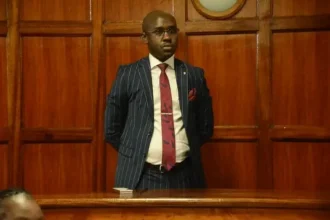The Allegations Against Abass Badru Omuyoma
In the complex landscape of legal matters, certain cases emerge as particularly notable due to their intricate details and public interest. One such case is the ongoing gold fraud allegations against Abass Badru Omuyoma, which have garnered significant attention in Kenya.
Omuyoma is accused of defrauding a complainant of Sh 7.1 million by falsely presenting a gold sale, with the prosecution claiming he acted alongside unidentified accomplices during the incident on August 11, 2021, in Nairobi County. The victim, believing they were purchasing authentic gold, soon realized they had been ensnared in a sophisticated scam.
Gold fraud is a recurring issue in Kenya, where the gold trade—both legitimate and illicit—creates fertile ground for such deceptive schemes, often involving enticing offers and counterfeit documentation that complicate detection efforts.
The legal proceedings in Omuyoma’s case have encountered several setbacks, including a recent adjournment due to the absence of both the prosecution and defense lawyers, prompting the court to reschedule the hearing for May 13 to allow adequate preparation.
While adjournments are a common occurrence in Kenya’s judicial system, they raise concerns about the efficiency of justice, especially in high-profile cases.
In a related matter, three businessmen—Erick Otieno, Alex Stephen Ogolla, and Mofat Gicheru Kamau—are also facing serious allegations of defrauding an Indian national by posing as intermediaries capable of securing a tender from the Ministry of Information, Communication, and Digital Economy.
Abass Badru Omuyoma
By exploiting the victim’s trust, the trio is said to have orchestrated an elaborate scam, siphoning money while offering fake assurances.
This case highlights the prevalence of fraud targeting foreign investors and the misuse of government institutions’ names to lend credibility to criminal schemes.
In another fraudulent procurement case, several individuals allegedly attempted to defraud a foreign entity by falsely claiming to procure 15 kilograms of gold. This scheme involved the use of fake credentials and deceitful practices. Omuyoma, under the alias Yuri Sande Ismael, was implicated in obtaining money through false pretences, further compounding his legal woes.
Such cases paint a worrying picture of how criminals exploit Kenya’s position as a hub for gold trade, leaving both local and international victims in financial ruin.
The accused individuals, including Omuyoma, were granted bail on a Sh 3 million bond with a surety of an equivalent amount. While this allows them temporary freedom, it underscores the gravity of the charges they face. Such a high bond is indicative of the court’s caution in cases involving large sums of money and financial fraud.
In a significant development, the presiding magistrate directed the Directorate of Criminal Investigations (DCI) to release a motor vehicle owned by one of the accused, Ogolla. The seizure of assets is a common practice in fraud investigations, often aimed at preserving evidence or compensating victims.
Kenya serves as a regional hub for gold trading, attracting buyers and sellers from across Africa and beyond. However, the informal nature of this trade has created loopholes that fraudsters exploit.
Fraud schemes are becoming increasingly sophisticated, involving fake documents, expertly crafted narratives, and even the impersonation of government officials. These tactics make it difficult for victims to detect scams until it’s too late.
The lack of stringent regulations in the gold market has allowed illicit activities to thrive. While authorities have made efforts to crack down on such crimes, enforcement remains a challenge due to limited resources and corruption within the system.
Cases like Omuyoma’s discourage both local and international investors from engaging in the Kenyan gold market. Fear of falling victim to fraud undermines the country’s reputation as a reliable business destination.
The frequent delays and adjournments in fraud cases reflect broader challenges within Kenya’s judicial system, including backlogs and resource constraints. This undermines public trust in the ability of courts to deliver timely justice.
The financial toll on victims—both individuals and businesses—is staggering. Many victims are left in financial distress, unable to recover their losses despite court interventions.
Kenya must enhance its legal and regulatory frameworks to combat gold fraud effectively. Stricter penalties and more robust oversight of the gold trade can deter potential fraudsters.
Educating the public about the risks of gold fraud is crucial. Awareness campaigns can help individuals identify red flags and avoid scams.
Enhanced cooperation between law enforcement, financial institutions, and international agencies is essential for tracking and dismantling criminal networks involved in gold fraud.
The gold fraud case involving Abass Badru Omuyoma is a stark reminder of the challenges facing Kenya’s justice system and the broader issue of financial fraud in the country.
As the legal proceedings unfold, the case serves as a cautionary tale for individuals and businesses navigating the complex world of gold trading. It also underscores the urgent need for systemic reforms to protect investors and maintain the integrity of Kenya’s markets.




